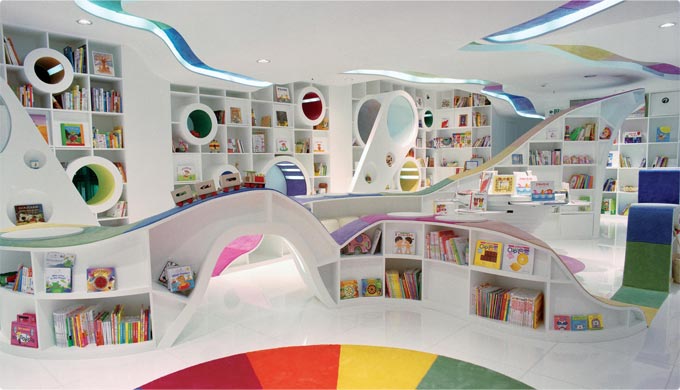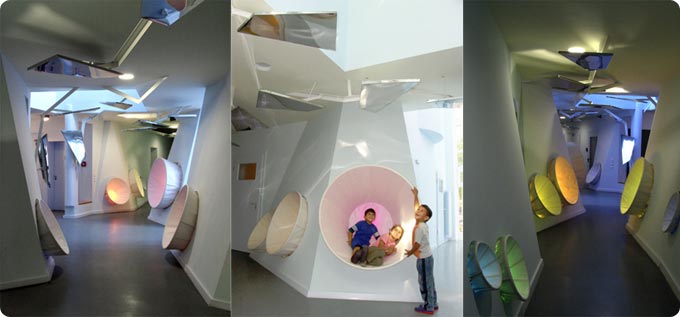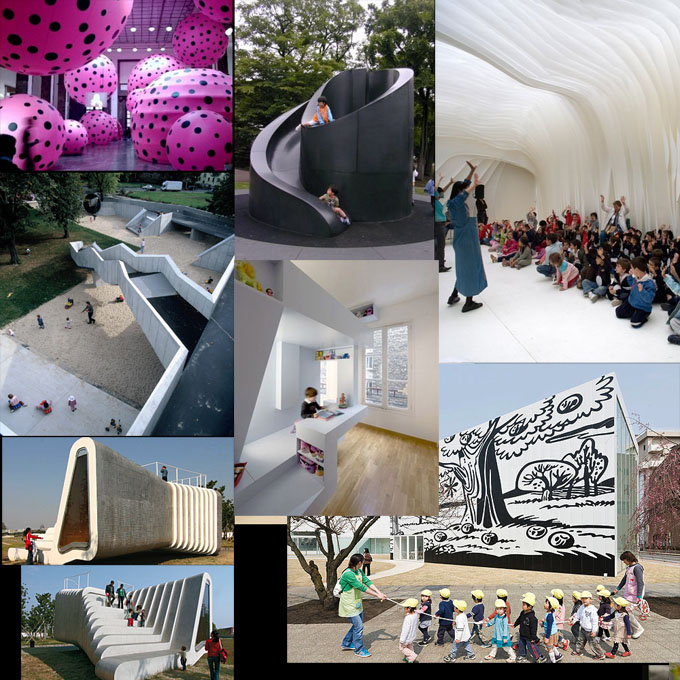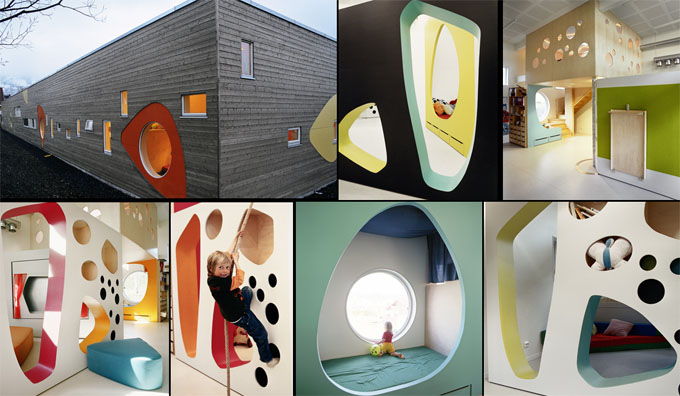What is a school? Is it simply a building where children go to learn about the world, or is it more important? It’s a cliche to think that our greatest natural resource is not the oil under our feet, but those kids in our schools. Even so, I think that we should be very careful in the way we design the spaces where they learn and play. Almost all of the schools in Kuwait have not been designed with kids in mind. They’re all drab, dreary, unimaginative and boring. I remember my school had a fence with barbed wire surrounding the playground. What kind of message does that send to the kids?

What’s with this recent obsession with new schools being named ‘X’BS (Bilingual School), seemingly oblivious to the common use of BS in the English language? It’s not as important what kids learn, but rather that they know how to learn. Most of the schools have the same curriculum and pedagogical model, and they all even look the same, except that they’re all painted a different color.

I want my future children to have every opportunity that can be provided to them. The problem is that looking around, the choices are depressingly scarce. What is a kid friendly space? The most important thing is that the physical space around them sort of gives them the permission to be free and curious. An authoritarian space drives discipline and order, but it also discourages freedom of expression. When kids feel like they can’t express themselves openly, they’ll find other ways to do so in secret, destructive ways.

I’m not a defender of the flowery self-esteem movement that has practically created a generation of Americans that feel undeservedly self-entitled and content with their incompetence and ignorance. I don’t want that for Kuwait. What I want is the option to have a school that understands the importance of creativity and imagination in the development of a young child, and would do everything it can to encourage that. The first step is to build a school that is, for lack of a better word, cool. It has to challenge children to be creative, to live up to and exceed the example set by the building.

Second, the curriculum needs to be flexible and geared towards the independent development cycle of each child. Every child is different and some need more guidance and supervision than others. Simply putting thirty kids in a room and demanding that they all learn at the same pace is very illogical. Similarly, tests will always be a part of the school system, but the curriculum should not revolve around what’s on the test. School has to be fun. For example, a teacher discovers that an unmotivated student in an English class is a hip hop fan; The teacher could ask that student to write a rap song as a class project. It’s not in the curriculum, but with some flexibility, that unmotivated student would be extremely interested to do something in class.

Finally, teachers should be allowed to experiment with alternative methods of teaching based on the situation they find themselves in. For example, if there are disruptive students in the class, they shouldn’t be allowed to slow down the rest of the class. They should quickly be reassigned to a special, albeit temporary, class that would include all the disruptive students. Of course, this special class would have a far more disciplined teacher and stricter penalties and a more structured environment. What I mean to say is that the environment has to be malleable enough to adapt to most situations. Every child is different, and we can’t treat them all the same.


I like these funky schools! And I agree that their should be something different but there is one problem that you shall face, and that bureaucracy. If a school doesn’t follow a sort of curriculum then they will not be acredited to either the American, British, French, or Arab system then they won’t be legally applicable as school, that is the problem we face in Kuwait.
very interesting topic… I wish certain law makers read this… and give this a try…
sCOOL.
Asalam 3alaikom,
I was reading this article and found it very interesting. However, I’m not one to patronize, so I’ll get right into what I didn’t agree with, or what I see as “inefficient” (a euphemism for, WRONG! Lo0ol). You mentioned the following in your article:
“Simply putting thirty kids in a room and demanding that they all learn at the same pace is very illogical.” And “Every child is different, and we can’t treat them all the same.”
I’m not sure if I agree with that statement. Setting a pace for every class is very important though I have to admit it has its drawbacks. When you set the pace in a classroom, you can easily measure how well students are performing by comparing their progress to the “set pace” of the course. If there was no pace, student’s progression through coursework would have no means of knowing whether they are up-to-par or not. Granted however, the biggest drawback is that students who have very high intellectual abilities will be held back by this pace.
The whole issue is like that of an Olympics 5,000 meter race. The runners are close together for the first, roughly 4,000 meters, and then they make a break for it in the final 1,000 meters. If we take that analogy and apply it to schooling, the final 1,000 meters is when the students graduate from school/university and make it on their own in the workplace.
The second statement “Every child is different, ……” is something I also don’t agree with. There is nothing wrong with treating students all the same way because when you do this, you are indirectly sending them the message that “this is the standard we want you to be at, anything less would mean you are falling behind and hence, corrective measure will have to be enforced.” That sounds a little scary “CORRECTIVE MEASURES”…lo0ol…but what I mean by that is you will be required to put more effort into your study etc. etc. However, it is important to realize that different and bad/lacking/behind are not synonymous terms. What I am trying to say is that different is sometimes not an efficient way of treating students, because there is no way of measuring “different.” Setting an absolute standard, and requiring people to live up to that standard is very measurable and sets a pace for that student.
That’s my point of view on that part of the article. Another part is the balancing act that a teacher has to apply in a class between being completely authoritative (like in an army) and allowing freedom of expression. Where do you draw this arbitrary line? Will it be based on a case-by-case basis (depending on % of bad behaving students in class, or some other standard)? Or is there some absolute standard that can apply to all classrooms?
Hope this helps!
Haitham, thanks for writing this, I really appreciate it. See, what you’re trying to do is what I think is wrong in the school system. You’re trying to create ‘The List’. I don’t like The List because it shows kids their supposed level of importance in life; and the way they’re organized on The List is by doing well on tests. I find it to be far more important that children, especially at a young age, be given the freedom to explore their own curiosities and learn to ask questions themselves.
This ‘conversation’ can be led by the teacher, but the initiative has to come from the students. The way schools work today is that the curriculum is set and enforced through fear. Stanley Kubrick once said “I think the big mistake in schools is trying to teach children anything, and by using fear as the basic motivation. Fear of getting failing grades, fear of not staying with your class, etc. Interest can produce learning on a scale compared to fear as a nuclear explosion to a firecracker.”
I can understand the basic human need to define people based on achievement. It’s only natural, but I don’t think it really helps us in any way. Testing and information validation makes sense only at the end of a students career, when such information is absolutely critical (testing doctors, lawyers, engineers, etc). At the early stages, even all the way through high school and undergraduate university, I don’t see the point of testing.
The question then becomes how do you select students to become doctors, lawyers and engineers if you don’t have a quantifiable way of measuring their abilities? I don’t think having The List is the only answer, but I can see why it’s so prevalent. It’s very easy for everyone to understand and accept. Study your ass off, get good grades, and then you can be a doctor! What makes me so fearful of this method is that I don’t see how a ‘creative’ student would have any sort of advantage over a memorization-machine student in this method (except in coming up with incredibly unique ways of cheating). That scares me because I believe creativity is far more important than the ability to memorize and calculate, especially in our modern computer age. What i’m trying to say is that the system as it is does not reward creativity, and in fact, it punishes it and to me that is a critical fault.
If I had schools like this growing up, I would’ve made sure I never missed a day.. and I wouldn’t have this feeling of dread every morning
Great post Barrak!
The pictures that you have posted are very funky! I wish we had schools like this in Kuwait!
I agree with all your points on how much the schooling system lacks in Kuwait! From the infrastructure of the school buildings to how the different lessons are taught. I think it is hard to be able to get away with being imaginative and innovative in your teaching styles when you fear being condemned by the Ministry of Education!
Do read up on Waldorf Education, it very much falls within your vision. Moreover, there are countless Waldorf schools around the world! Now wouldn’t that be something to bring here to Kuwait.
The Waldorf Schools are very similar to what I have in mind, but their emphasis on a sort of extra-sensory, spiritual mumbo jumbo scares me a bit. I do admire the way they connect with kids by encouraging their creative impulses; but critics argue that it often devolves into simple exercises in maintaining self esteem. In any case, it certainly won’t hurt in having that option available in Kuwait. I wouldn’t mind sending my kids there once I start a family.
I love love love the photos that you have posted. I’m the sort of person who gets really excited and motivated by rainbow colored themes.
I wish we could see more of these themes here in Kuwait.
montessori is along the lines of what you are speaking about also. A little less liberal than the waldork method. i agree with you entirel!y
Hi I recently discovered your blog and I’m currently a teacher in one of the American schools here in Kuwait, you are so right about everything. imagine i have 25 kids in my class and the space is so small, and they say it’s Ämerican”. I would also like to point out that kids who are low achievers are passing through the next level by something called “wasta”because simply they are paying money for their child to go the next level and don’t want them to repeat their grade because of their image. I was forced to give a few kids a passing grade because of that and now they will suffer all their life
It’s a good school but I wish some things would just change! These pictures above are just awesome wish more schools would look like that…..Love your blog 🙂
hey!
i just found out about ur blog as i am researching bringing such idea of schools like waldorf to kuwait 🙂 if u have any ideas that would help pls let me know!